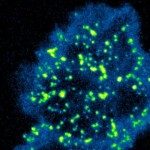Lien vers Pubmed [PMID] – 28107427
Lien DOI – 10.1371/journal.pone.0170396
PLoS ONE 2017 ; 12(1): e0170396
The adapter protein SLP76 is a key orchestrator of T cell receptor (TCR) signal transduction. We previously identified a negative feedback loop that modulates T cell activation, involving phosphorylation of Ser376 of SLP76 by the hematopoietic progenitor kinase 1 (HPK1). However, the physiological relevance of this regulatory mechanism was still unknown. To address this question, we generated a SLP76-S376A-expressing knock-in mouse strain and investigated the effects of Ser376 mutation on T cell development and function. We report here that SLP76-S376A-expressing mice exhibit normal thymocyte development and no detectable phenotypic alterations in mature T cell subsets or other lymphoid and myeloid cell lineages. Biochemical analyses revealed that mutant T cells were hypersensitive to TCR stimulation. Indeed, phosphorylation of several signaling proteins, including SLP76 itself, phospholipase Cγ1 and the protein kinases AKT and ERK1/2, was increased. These modifications correlated with increased Th1-type and decreased Th2-type cytokine production by SLP76-S376A T cells, but did not result in significant changes of proliferative capacity nor activation-induced cell death susceptibility. Hence, our results reveal that SLP76-Ser376 phosphorylation does not mediate all HPK1-dependent regulatory effects in T cells but it fine-tunes helper T cell responses.

